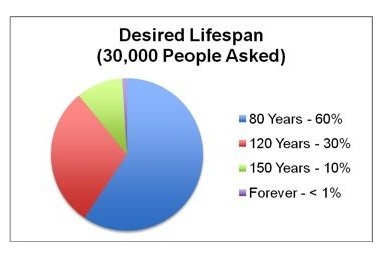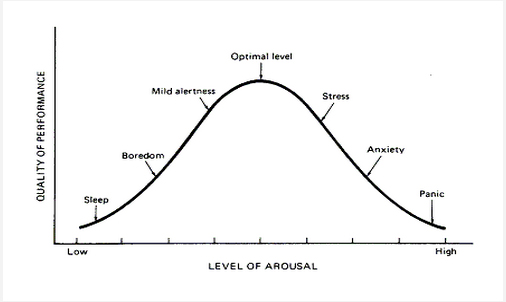Is it possible to live forever?
Aging is inevitable. But when you "get old" can vary dramatically.

A free daily email with the biggest news stories of the day – and the best features from TheWeek.com
You are now subscribed
Your newsletter sign-up was successful

The person with the longest confirmed lifespan is Jeanne Clement. She lived to be 122 and died in 1997.
Imagining living that long almost makes your head hurt.
This lady met Vincent Van Gogh. In person. For real. And was around to see the internet, too. Imagine your retirement age and middle age being the same thing. She was still riding her bicycle everywhere until 100. Lived on her own until 110.
The Week
Escape your echo chamber. Get the facts behind the news, plus analysis from multiple perspectives.

Sign up for The Week's Free Newsletters
From our morning news briefing to a weekly Good News Newsletter, get the best of The Week delivered directly to your inbox.
From our morning news briefing to a weekly Good News Newsletter, get the best of The Week delivered directly to your inbox.
There's pretty much no way you're gonna live that long. Drink wheatgrass shots and do yoga until you're a human pretzel, but nope.
People who live past 95 don't have healthier habits than you or I do — in fact, Clement smoked until she was 117. These people just have amazing genes: People who live to 95 or older are no more virtuous than the rest of us in terms of their diet, exercise routine, or smoking and drinking habits, according to researchers at Albert Einstein College of Medicine of Yeshiva University. Instead, they say that "centenarians may possess additional longevity genes that help to buffer them against the harmful effects of an unhealthy lifestyle."
After getting genetic testing done by 23andme, I found out I have two genes associated with longevity. Hooray for me. But will they get me past 125?
Looks like a big "no." Though the average human lifespan keeps going up, the latest research says the limit doesn't seem to budge at all.
A free daily email with the biggest news stories of the day – and the best features from TheWeek.com
Matt Ridley, author of The Red Queen: Sex and the Evolution of Human Nature, notes recent findings that human lifespan may have a hard stop around 125:
The lack of any increase in people living past 110 is surprising. Demographers are so used to rising average longevity that they might expect to see more of us pushing the boundaries of extreme old age as well. Instead, there is an enormous increase in 100-year-olds and not much change in 110-year-olds. The smidgin of good news for the pension industry, therefore, is that it seems that human lifespan comes with some sort of a sell-by date. [The Red Queen]
We might have genetic limits...but what if we can change our genetics?
Mean genes
By manipulating the genes of a worm, Cynthia Kenyon was able to increase its lifespan — by 10 times.
And she didn't just add more crappy years at the end. She extended the young, healthy years.
Is this something we can do for humans? One day, possibly. I'd love to see Hallmark cards that say "Happy 800th birthday!"
But what would that really be like? We can't be sure but look at stories throughout history and, man, trying to live forever never works out well. Try to cheat death, and you'll regret it.
Dorian Gray, Gilgamesh, Frankenstein...throw in Blade Runner, too. These are not success stories.
Mortals seeking to live beyond a "natural" life span usually don't come out well in myths and stories across cultures and history…Comparable tales appear in texts and myths from Persia, China, Africa and Mesoamerica, all projecting the theme that immortality is for the gods, and mortals should remain mortal. [When I'm 164: The New Science of Radical Life Extension, and What Happens If It Succeeds]
Remember that Clement lady I mentioned? Her husband died in 1942... but she lived another 55 years. In fact, she lived long enough to see her daughter and grandson die before she did. That's no fun.
And in our hearts, we all know this. When you survey people about how long they want to live, what do they say?

We don't want to live forever. We want to live a good life. How can we do that?
What we can do
Louis CK knows what it's like to get older:
Yes, super genetics mean you'll be around to smoke at 117 — but what about for the rest of us?
How you feel right now is a half decent way to determine whether you'll die in the next 30 years. Aging is inevitable. But when you "get old" can vary dramatically. After age 40, your chronological age is actually a poor predictor of how "old" you are:
The Baltimore Longitudinal Study of Aging, a massive effort that tracked 3,000 people from their 20s to their 90s, concluded that people age at such vastly different rates that by the time they reach 80 or 90, the differences are so marked that birth dates are entirely irrelevant. In fact, there seems to be widespread agreement that after age 35 or 40, the date on your birth certificate is one of the least accurate indications of how old you are. Yes: Every day you get older. But the pace at which you grow older varies enormously. We don't have control over the former. We do have far more control than we think over the latter. [Counterclockwise: My Year of Hypnosis, Hormones, Dark Chocolate, and Other Adventures in the World of Anti-aging]
Be a little vain: People who look young for their age live longer. Making an effort to look young and act young can help you stay young. Older people with positive perceptions of aging lived 7.5 years longer.
What else can you do to extend your life while improving the quality?
1. Relationships are the most important thing
There is a single question that best predicts whether you'll be alive at age 80:
Is there someone in your life whom you would feel comfortable phoning at four in the morning to tell your troubles to? If your answer is yes, you will likely live longer than someone whose answer is no… [Flourish: A Visionary New Understanding of Happiness and Well-being]
Cynthia Kenyon admits to dramatically changing her diet due to the results of her research. She now consistently eats low carb:
No desserts. No sweets. No potatoes. No rice. No bread. No pasta. "When I say 'no,' I mean 'no, or not much,'" she notes. "Instead, eat green vegetables. Eat the fruits that aren't the sweet fruits, like melon." Bananas? "Bananas are a little sweet." Meat? "Meat, yes, of course. Avocados. All vegetables. Nuts. Fish. Chicken. That's what I eat. Cheese. Eggs. And one glass of red wine a day." [PLOS Biology]
But the results of the Terman study seem to say you should be a little more concerned about your friends than your body: "…connecting with and helping others is more important than obsessing over a rigorous exercise program."
Want to make your life better? This study shows it's your relationships that can determine whether or not you succeed.
"The groups you associate with often determine the type of person you become. For people who want improved health, association with other healthy people is usually the strongest and most direct path of change," says Howard S. Friedman in The Longevity Project: Surprising Discoveries for Health and Long Life from the Landmark Eight-Decade Study.
The Grant Study found that "the capacity to love and be loved was the single strength most clearly associated with subjective well-being at age eighty."
"In a study led by Derek Isaacowitz, we found that the capacity to love and be loved was the single strength most clearly associated with subjective well-being at age eighty," says Martin E.P. Seligman in Flourish: A Visionary New Understanding of Happiness and Well-being.
The leader of the study said the main thing he learned from the research was that "the only thing that really matters in life are your relationships to other people."
2. Be a good person
It wasn't getting help from others that conferred a long life. It was giving help:
We figured that if a Terman participant sincerely felt that he or she had friends and relatives to count on when having a hard time, then that person would be healthier. Those who felt very loved and cared for, we predicted, would live the longest. Surprise: Our prediction was wrong...Beyond social network size, the clearest benefit of social relationships came from helping others. Those who helped their friends and neighbors, advising and caring for others, tended to live to old age. [Friedman]
The good do not die young, as the old saying goes. In fact, they live longer:
…there's no real evidence that the good die young. In fact, although there are always some exceptions (which are therefore notable), generally speaking, it's the good ones who can actually help shape their fate; the bad die early, and the good do great. [Friedman]
3. Get your act together
Was there a personality trait that was tied to a long, healthy life? Yes. Conscientiousness.
Conscientiousness, which was the best predictor of longevity when measured in childhood, also turned out to be the best personality predictor of long life when measured in adulthood…By the end of the twentieth century, 70 percent of the Terman men and 51 percent of the Terman women had died. It was the unconscientious among them who had been dying in especially large numbers. [Friedman]
Truly fascinating: After a heart attack, conscientious people were not only more likely to recover because they were better about taking their meds, but conscientiousness was a better predictor of improvement than the medication itself. Conscientious people who took a placebo did better than the less conscientious who got the real medication:
Most interesting to us, however, was that the conscientious patients (the good adherers) were much more likely to survive whether they were on the Propranolol medication or on the placebo. Being conscientious enough — adherent enough — to fully cooperate with treatment, even if with a placebo, emerged as a more important predictor of mortality risk than the medication itself. [Friedman]
4. Stress isn't always a bad thing
Don't avoid all stress. You need some stress. Research shows those who work the hardest live the longest:
There is a terrible misunderstanding about stress. Chronic physiological disturbance is not at all the same thing as hard work, social challenges or demanding careers. People are being given rotten advice to slow down, take it easy, stop worrying and retire to Florida. The Longevity Project discovered that those who worked the hardest lived the longest. The responsible and successful achievers thrived in every way, especially if they were dedicated to things and people beyond themselves. [Friedman]
Retirement, on the other hand, will kill you. And you need a moderate level of arousal to perform at your best:

5. Want to live a long time? Make yourself happy.
We associate health with having to do things that make us unhappy: Don't eat that, go jogging, etc. The research shows a fascinating link between what it takes to live a long life and what it takes to have a happy life: "Many (but not all) of the recommendations for happiness are nearly identical to recommendations for maintaining health," says Friedman.
For example, those trying to improve their happiness are advised to do the following things:
- Watch less TV
- Improve social relations — spend time with friends
- Increase levels of physical activity — go for a walk
- Help others, and express gratitude to those who have helped you
- Take on new challenges to remain fresh and in the moment
Laugh a lot. Be happy. Be optimistic. Have lots of good sex. Get enough sleep. Stay out of debt. Forgive.
We may not be able to live forever, but we can live well.
Join 45K+ readers. Get a free weekly update via email here.
More from Barking Up The Wrong Tree:
-
 The Week Unwrapped: Do the Freemasons have too much sway in the police force?
The Week Unwrapped: Do the Freemasons have too much sway in the police force?Podcast Plus, what does the growing popularity of prediction markets mean for the future? And why are UK film and TV workers struggling?
-
 Properties of the week: pretty thatched cottages
Properties of the week: pretty thatched cottagesThe Week Recommends Featuring homes in West Sussex, Dorset and Suffolk
-
 The week’s best photos
The week’s best photosIn Pictures An explosive meal, a carnival of joy, and more